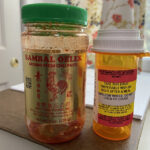August 15, 2023

Burda on Healthcare: Ground Fresh Healthcare Chili Paste
If you’re a regular reader of my weekly blog posts or monthly columns for 4sight Health, you know that I believe that healthcare is no different from any other industry in terms of economics. And businesses in healthcare behave just like businesses in any other industry in response to economic incentives.
A recent search for a specific brand of Asian hot chili paste only reinforced that belief.
The brand is Sambal Oelek. A company called Huy Fong Foods, based in Irwindale, California, makes Sambal Oelek, which is a “ground fresh chili paste.” It comes in an 8-ounce plastic bottle with a gold label and a green lid. My wife bought a jar a year ago, and we were hooked. We put a little in anything I cook to make it taste better because as you know, I’ll never have my own show on the Food Network.
You can read more about that in “I’d Like Some Interoperability With My Value-Based Care, Please.”
We ran out of Sambal Oelek a few months back, and we couldn’t find it at our local grocery store. We expanded our search to other grocery store chains in our area and still no luck. We even started going to Asian food markets outside of our initial search radius. Nothing.
A few weeks ago, I decided to visit the company’s website, which is listed on the label. I tried to order some online, but there’s no online ordering. So, I called the number on the site, and a polite young man explained to me that the company doesn’t sell direct to consumers, only direct to stores. When I told him that wasn’t working for me, he said they stopped making Sambal Oelek because of a supply chain issue. A shortage of peppers stopped production.
I asked him when production would start up again, and he said he didn’t know. He said they did start getting more peppers, but the company will use those to resume making its top seller, its Sriracha sauce. I get that. Any good business would devote limited resources to the product or service that will generate the most revenue. He didn’t know when production of Sambal Oelek would restart. I thanked him for his time and told him how much I would appreciate Sambal Oelek going into production again.
In Search of a Market-Based Solution
 Well, I did what any good husband would do if his wife craved something to kill the taste of his food and make it eatable again, and that’s search the internet.
Well, I did what any good husband would do if his wife craved something to kill the taste of his food and make it eatable again, and that’s search the internet.
I did, and I found a lot of people selling unopened jars of Sambal Oelek online because of the national shortage caused by the hot pepper supply chain issue. People were selling jars for between $25 to $50 per jar individually or sometimes in sets of four or five. Pre-shortage, you could buy a jar at our grocery store for about $3. That’s an 800% to 1,600% markup because of the shortage if my math is right. If it isn’t, you still get the point.
I bought one jar for $25. With a $10 shipping charge, I paid $35. It arrived four days later in my mailbox, and it’s now the most expensive thing in my refrigerator. We haven’t opened it yet. But when we do, we agreed to dole it out by the quarter teaspoon until the shortage ends or we need to buy another jar on the black market.
It’s like pill-splitting when the pharmacy runs out of your beta blocker and can’t refill your prescription. There’s your segue into today’s healthcare lesson.
Prescription Drug Shortages and Drug Prices
While I was waiting for my third-hand jar of Sambal Oelek to arrive, I happened to read this report from the U.S. Department of Health and Human Services Office of the Assistant Secretary for Planning and Evaluation, or ASPE. The 32-page report is on how the ongoing shortages of prescription drugs are affecting consumers.
Using data from the Food and Drug Administration and IQVIA that the Rand Corporation crunched and analyzed for the ASPE, the report made the following findings:
- The average shortage of a prescription drug affected at least 500,000 consumers.
- The average shortage of a prescription drug reduced prescription sales by 28% to 35%.
- The average shortage of a prescription drug increased the drug’s price by 16.6%.
Dozens of prescription drugs are in short supply, according to the current drug shortage list maintained by the University of Utah and the American Society of Health-System Pharmacists. The many causes of drug shortages include the inability to procure raw materials, supply chain disruptions, distribution challenges, manufacturing plant quality issues and overseas production problems.
Like the shortage of Samba Oelek driving up the price of a single jar of ground fresh chili paste, the shortage of a drug drives up the price of a prescription for that drug. It’s the basic law of supply and demand. When demand outstrips supply, the price goes up. It’s the same in healthcare as it is in any other industry.
There is one important difference, though. I may think I’ll die if I don’t get my hands on a jar of Samba Oelek. But I won’t really die. If cancer patients can’t get their hands on chemotherapy drugs, they will die. If I paid $25 plus shipping for a small jar of hot chili paste, how much do you think cancer patients would pay for their chemotherapy drugs? The answer is anything, even if it means exhausting their life savings, incurring medical debt and going into bankruptcy.
You can read more about that in “The Myth of Value-Based Pricing for Cancer Drugs.”
If you believe that market-based solutions work, and I do, both the shortages of Samba Oelek and drugs will resolve themselves. Someone will start growing more hot peppers, someone will make a tastier hot chili paste or someone, like me, might start growing their own peppers and make their own chili paste. Just like someone will start manufacturing more pills, develop a more effective drug, or bring back drug manufacturing to the U.S. to avoid geo-political disruptions.
Until then, brother, can you spare some Sambal Oelek? Or at least a beta blocker?
Thanks for reading.





